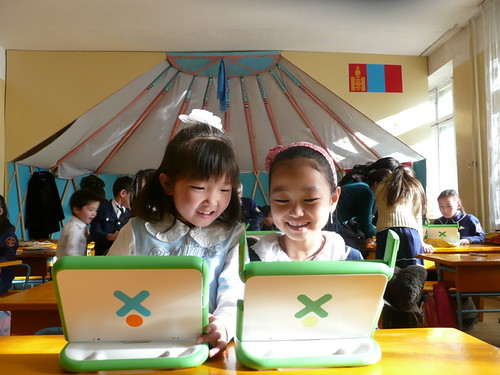The Strategic Analysis Centre has released its report on the digital divide in France and provides some recommendations to help the less connected to join the digital world. According to the report there are three major gaps that require "a strong and sustained political action and broad information campaigns." The first is generational with only 16.9% of those over age 75 with a home computer and 15% of them being connected to the Internet.
In comparison, 90.8% aged 15-24 have access to a computer and 83.73% have Internet at home. At first glance, this problem has limited scope. The elderly have needs digital low and many of them have neither the desire nor the need to stay connected. This gap should be filled naturally with the aging generation who grew up with computers.
Nevertheless, as highlighted in the report, it would be damaging for France to ignore the problem. As shown in Denmark or Finland, where 65% and 68% of seniors use the Internet, this activity helps the elderly out of isolation while providing an intellectually stimulating activity. The French seniors are late, but training programs free or low cost and installation of computers in homes are great assets that have been successful in other European countries like the Netherlands or the United Kingdom.
The other two important gaps in scope. The social divide is probably the one most obvious and most media. Only 34% of people on low incomes (between 150 € and 999 € per month) have a computer at home and 28.2% have an Internet connection, against 91% and 87.1% respectively for the French income highest.
Solving this problem will pass, according to the report, by subscriptions to the Internet cheaper. There are offers for less than 10 € in Canada and less than 14 € in Denmark. France could also implement a "social tariff", but this solution is viable, it would require a modification of the European directives for Internet high beginning to become "a component of universal service of electronic communications" It is also imperative to make computers available to disadvantaged families.
"In Canada, one million computers have been collected and refurbished and then distributed to schools and nonprofit organizations. . The report also welcomes the French initiative similar "Ordi 2.0. Finally, there is finally a cultural divide with only 56% of the least educated (less than the baccalaureate) with a computer at home and 50.5% having Internet access.
It is therefore important to bridge the "digital illiteracy" by facilitating access to skills needed to handle these tools. It starts from an early age and at school, but also by helping the French to master a computer. For example, Roayume Kingdom, finding a job is often associated with computer training. 


In comparison, 90.8% aged 15-24 have access to a computer and 83.73% have Internet at home. At first glance, this problem has limited scope. The elderly have needs digital low and many of them have neither the desire nor the need to stay connected. This gap should be filled naturally with the aging generation who grew up with computers.
Nevertheless, as highlighted in the report, it would be damaging for France to ignore the problem. As shown in Denmark or Finland, where 65% and 68% of seniors use the Internet, this activity helps the elderly out of isolation while providing an intellectually stimulating activity. The French seniors are late, but training programs free or low cost and installation of computers in homes are great assets that have been successful in other European countries like the Netherlands or the United Kingdom.
The other two important gaps in scope. The social divide is probably the one most obvious and most media. Only 34% of people on low incomes (between 150 € and 999 € per month) have a computer at home and 28.2% have an Internet connection, against 91% and 87.1% respectively for the French income highest.
Solving this problem will pass, according to the report, by subscriptions to the Internet cheaper. There are offers for less than 10 € in Canada and less than 14 € in Denmark. France could also implement a "social tariff", but this solution is viable, it would require a modification of the European directives for Internet high beginning to become "a component of universal service of electronic communications" It is also imperative to make computers available to disadvantaged families.
"In Canada, one million computers have been collected and refurbished and then distributed to schools and nonprofit organizations. . The report also welcomes the French initiative similar "Ordi 2.0. Finally, there is finally a cultural divide with only 56% of the least educated (less than the baccalaureate) with a computer at home and 50.5% having Internet access.
It is therefore important to bridge the "digital illiteracy" by facilitating access to skills needed to handle these tools. It starts from an early age and at school, but also by helping the French to master a computer. For example, Roayume Kingdom, finding a job is often associated with computer training.



No comments:
Post a Comment